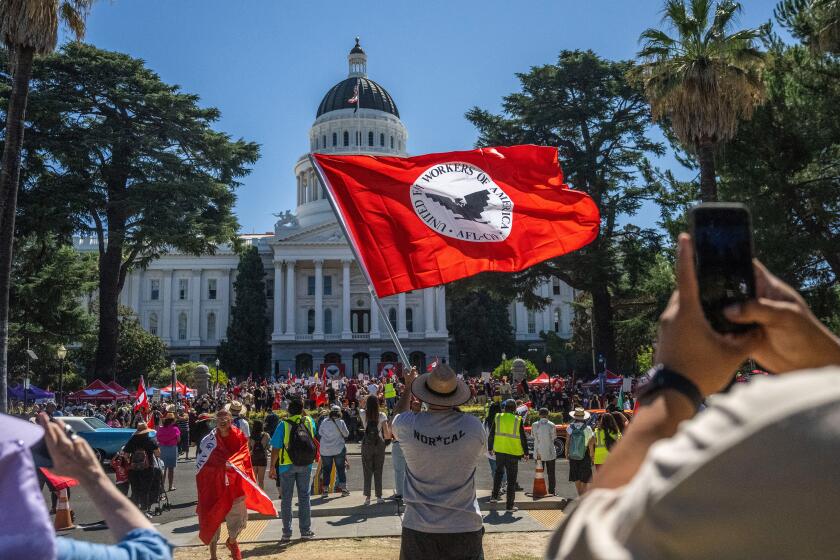Bottom Line Is Stocks Are Likely to Fall
This too shall pass, but what then? What’s ahead, for the takeover game, for the stock market, and for American business and the economy once the disturbance of the Boesky insider trading scandal runs its course?
To come right to the point, the stock market is likely to decline--not perhaps with a precipitous fall but with a steady ratcheting down to a lower level reflecting different economic circumstances for U.S. companies.
That may seem an odd thing to say after the market’s strong rise on Thursday. But that rise seemed more a sigh of relief than anything else. The investing public looked around, saw that the insider scandal had not led to a widespread collapse of stocks or “junk” bonds--or even to the end of takeovers--and bought with both hands.
So much for the emotions of the moment. The judgment that a market decline lies ahead is based more on underlying factors--on the fact that the cash flows of U.S. companies are now in decline, when within the last two years they rose to historic levels. Cash flow is the business term used to denote not only a company’s net income but also its allowances for depreciation and other accounting items that represent money deferred from tax payments and therefore available to the business for expansion or other purposes.
Tax Reform Had Key Role
How important is cash flow? All important. In fact, it was the historic levels of cash within companies that gave rise to the takeover frenzy in the U.S. economy in the last two years--and therefore created the climate for the takeover frenzy’s noxious byproduct, the insider trading scandal.
And just so you understand how interrelated events are in our economy, it was the Economic Recovery Tax Act of 1981 that ultimately caused U.S. corporations to have high levels of cash in 1985 and 1986. Therefore, they were sitting ducks for raiders who could buy the companies on the stock market and pay off the purchase price with the available cash.
Call it an example of the law of unintended consequences.
Here is the sequence. In 1981, with the economy entering recession, the Reagan Administration cut business taxes by liberalizing depreciation in the hope that companies would pour the cash into new plants and equipment and give the economy a needed lift.
The tax policy worked, too. Business spending, if you remember, was strong in 1983 and 1984, especially for computers and robots and other products designed to make U.S. industry more efficient. Commercial and industrial buildings got built, and so did residential housing. The stock market noticed all of this and, in August, 1982, took off on what to date is one of the longest-running bull markets in history.
Cash Piled Up
But capital spending peaked in 1985 and since then has been lagging. Why? Because the U.S. and world economies have not been growing fast enough to warrant a business expanding. And so the cash piled up. It reached an aggregate of $200 billion for U.S. corporations as a whole earlier this year, according to an analysis by Charles I. Clough, director of investment policy for Cowen & Co. And it provided a powerful lure to the species called corporate raiders, who have enriched themselves by holding up companies and demanding, in effect, “your money or your life.”
Now that game is changing. For one thing, the cash flows are declining because the companies have purchased fewer depreciable assets in the last two years. Thus, there is less cash with which to pay acquisition debt (or junk-bond interest). For another, the Tax Reform Act of 1986 reduces corporate cash flow by lowering depreciation and taking away investment tax credits. It also includes an accounting change that makes takeovers less attractive.
The result won’t be the elimination of mergers and acquisitions, although there will be fewer of them. That is probably an intended consequence, if you reflect on how Congress and the public as a whole have been disturbed by the takeover game.
Another result, however unintended, is likely to be tough sledding for the stock market in early 1987. Clough of Cowen & Co. sees stock prices weakening already in the over-the-counter market and in broader samplings of New York Stock Exchange issues. And he is not alone. Leon Cooperman, a managing partner of the investment banking firm of Goldman, Sachs & Co., notes how relatively high stock prices have risen in the last four years. “Too high?” asks Cooperman rhetorically. “Let’s just say they’re richly appraised.”
Well, nothing lasts forever in our changing economy, not tax policy nor bull markets, not takeover games nor illegal schemes. Maybe that’s why it works.






